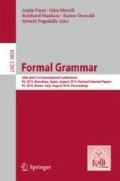Abstract
We provide some additional completeness results for the full Lambek calculus and syntactic concept lattices, where the underlying structure is extended to tuples of arbitrary finite and infinite size. Whereas this answers an open question for finite tuples, infinite tuples have not been considered yet. Nonetheless, they have a number of interesting properties which we establish in this paper, such as a particular class of languages which results in a finite lattice.
Notes
- 1.
Or words, respectively, depending on whether we think of our language as a set of words or a set of strings of words; we will choose the former option.
- 2.
Whereas L and L1 are equally powerful in the sense of languages which are recognizable, [11] shows that \(\mathbf{FL }\) is considerably more powerful than L: whereas L only recognizes context-free languages by the classical result of [17], \(\mathbf{FL }\) can recognize any finite intersection of context-free languages. We only briefly mention this, because we have no space to make precise what it means for a calculus to recognize a class of languages.
References
Buszkowski, W.: Completeness results for Lambek syntactic calculus. Math. Logic Q. 32(1–5), 13–28 (1986)
Buszkowski, W.: Algebraic structures in categorial grammar. Theor. Comput. Sci. 1998(1–2), 5–24 (1998)
Clark, A.: A learnable representation for syntax using residuated lattices. In: de Groote, P., Egg, M., Kallmeyer, L. (eds.) Formal Grammar. LNCS, vol. 5591, pp. 183–198. Springer, Heidelberg (2011)
Clark, A.: Learning context free grammars with the syntactic concept lattice. In: Sempere, J.M., García, P. (eds.) ICGI 2010. LNCS, vol. 6339, pp. 38–51. Springer, Heidelberg (2010)
Clark, A.: Logical grammars, logical theories. In: Béchet, D., Dikovsky, A. (eds.) Logical Aspects of Computational Linguistics. LNCS, vol. 7351, pp. 1–20. Springer, Heidelberg (2012)
Clark, A.: The syntactic concept lattice: another algebraic theory of the context-free languages? J. Logic Comput. 25(5), 1203–1229 (2013)
Davey, B.A., Priestley, H.A.: Introduction to Lattices and Order, 2nd edn. Cambridge University Press, Cambridge (1991)
Farulewski, M.: On finite models of the Lambek calculus. Studia Logica 80(1), 63–74 (2005)
Galatos, N., Jipsen, P., Kowalski, T., Ono, H.: Residuated Lattices: An Algebraic Glimpse at Substructural Logics. Elsevier, Amsterdam (2007)
Harris, Z.S.: Structural Linguistics. The University of Chicago Press, Chicago (1963)
Kanazawa, M.: The Lambek calculus enriched with additional connectives. J. Logic Lang. Inf. 1, 141–171 (1992)
Kanazawa, M., Michaelis, J., Salvati, S., Yoshinaka, R.: Well-nestedness properly subsumes strict derivational minimalism. In: Pogodalla, S., Prost, J.-P. (eds.) Logical Aspects of Computational Linguistics. LNCS, vol. 6736, pp. 112–128. Springer, Heidelberg (2011)
Lambek, J.: The mathematics of sentence structure. Am. Math. Monthly 65, 154–169 (1958)
Lambek, J.: On the calculus of syntactic types. In: Jakobson, R. (ed.) Structure of Language and its Mathematica Vl Aspects, pp. 166–178. American Mathematical Society, Providence (1961)
Morrill, G., Valentín, O., Fadda, M.: The displacement calculus. J. Logic Lang. Inf. 20(1), 1–48 (2011)
Okada, M., Terui, K.: The finite model property for various fragments of intuitionistic linear logic. J. Symb. Log. 64(2), 790–802 (1999)
Pentus, M.: Lambek grammars are context free. In: Proceedings of the 8th Annual IEEE Symposium on Logic in Computer Science, Los Alamitos, California, pp. 429–433. IEEE Computer Society Press (1993)
Sestier, A.: Contributions à une théorie ensembliste des classifications linguistiques. In: Actes du Ier Congrès de l’AFCAL, Grenoble, pp. 293–305 (1960) (Contributions to a set-theoretical theory of classifications)
Wurm, C.: Completeness of full Lambek calculus for syntactic concept lattices. In: Morrill, G., Nederhof, M.-J. (eds.) Formal Grammar 2012 and 2013. LNCS, vol. 8036, pp. 126–141. Springer, Heidelberg (2013)
Author information
Authors and Affiliations
Corresponding author
Editor information
Editors and Affiliations
Rights and permissions
Copyright information
© 2016 Springer-Verlag Berlin Heidelberg
About this paper
Cite this paper
Wurm, C. (2016). On Some Extensions of Syntactic Concept Lattices: Completeness and Finiteness Results. In: Foret, A., Morrill, G., Muskens, R., Osswald, R., Pogodalla, S. (eds) Formal Grammar. FG FG 2015 2016. Lecture Notes in Computer Science(), vol 9804. Springer, Berlin, Heidelberg. https://doi.org/10.1007/978-3-662-53042-9_10
Download citation
DOI: https://doi.org/10.1007/978-3-662-53042-9_10
Published:
Publisher Name: Springer, Berlin, Heidelberg
Print ISBN: 978-3-662-53041-2
Online ISBN: 978-3-662-53042-9
eBook Packages: Computer ScienceComputer Science (R0)

